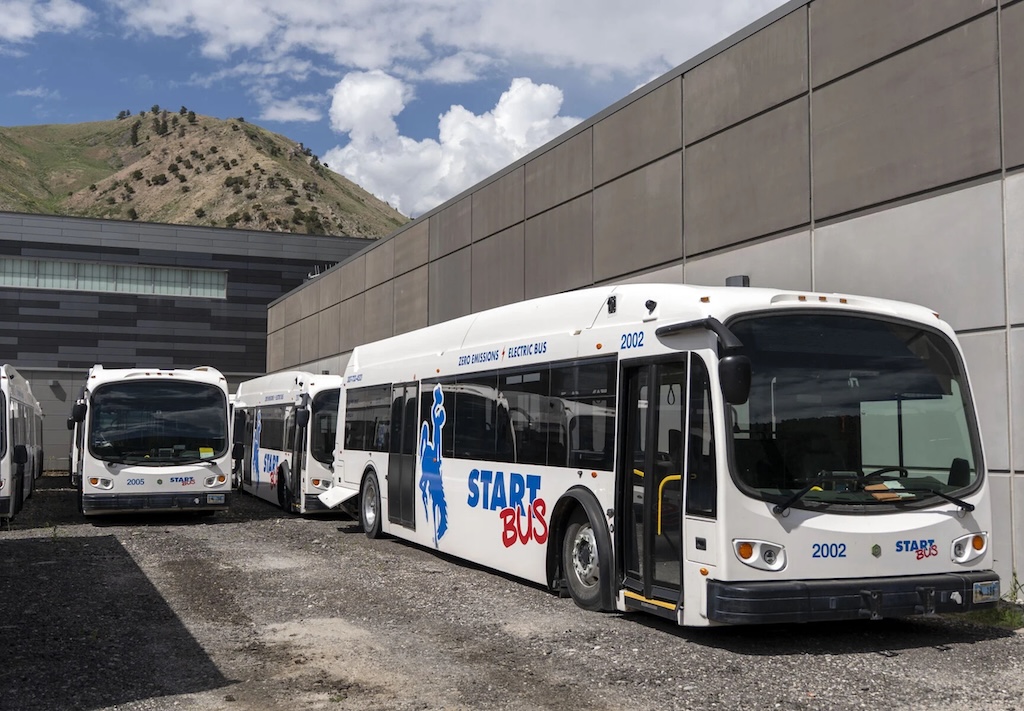For defunct electric buses, Teton County taxpayers may be on the hook for $1 million
By Dahl Erickson
June 12, 2025

Jackson and Teton County are seeking a federal waiver to dispose of six now-defunct electric buses purchased in 2019. The company that supplied the vehicles went bankrupt, rendering replacement parts virtually impossible to obtain. Photo by Bradly J. Boner, Jackson Hole News&Guide.
• START eyes federal waiver to save the cash as town, county move to buy new diesel, hybrids.
By Noah McLane
Jackson Hole News&Guide
Via- Wyoming News Exchange
JACKSON — Taxpayers in Jackson and Teton County may have to pay more than $1 million for eight now-defunct electric buses purchased in 2019.
The buses are sitting unused, taking up space in the START headquarters west of Karns Meadow.
But the community’s Transit Director, Bruce Abel, is hopeful that the federal government will grant START, Jackson Hole’s public transportation department, a waiver to dispose of the buses early.
In August 2018, START received $2.3 million from the U.S. Department of Transportation’s Federal Transit Administration to purchase the electric buses from Proterra.
A Biden-era federal grant, which provided money encouraging public transportation agencies to invest in low-emission vehicles, mainly battery-powered electric buses, covered 80% of the cost — as long as the governments used the vehicles for their “useful lifespan,” roughly 12 years.
“Under normal circumstances,” Abel said, “if we were to dispose of these vehicles early, we would be responsible for paying back half of the federal share of the purchase price of these buses.”
But Jackson’s electric bus debacle has been anything but ordinary.
The dust up
The News&Guide reported in 2023 that only five of the eight buses remained in service, due to poor battery performance and difficulty getting parts.
After becoming the de facto poster child of former President Joe Biden’s public transit grant program, the buses’ manufacturer, Proterra, a U.S.-based company that manufactured batteries, had gone bankrupt.
“We got snake bit by the Proterra situation.” —Wes Gardner, Teton County commissioner
Biden touted Proterra during a virtual tour of the company’s manufacturing plants in 2021, saying they made him “look good.”
But two years later, the California-based company had gone out of business and Teton County couldn’t order parts to repair its buses.
The community’s debacle ended up on Fox News, where former Teton County Commissioner Paul Vogelheim criticized the town and county, saying they should have purchased buses that ran on natural gas.
“We got snake bit by the Proterra situation,” Wes Gardner, vice chair of the Teton County commission, said at a June 2 meeting. “And the bleeding edge is a bloody place sometimes.”
A glimmer of hope does, however, remain for Teton County taxpayers.
Federal officials granted a waiver to Des Moines, Iowa’s public transit system, DART, that allowed it to dispose of its entire electric fleet this April. All of Des Moines’ buses were purchased from Proterra.
Similar to START, DART’s buses were pulled from service barely two years into their expected lifespan due to battery issues and safety concerns, according to Axios.
New buses inbound
Buying the uncertainty, the Jackson Town Council and the Teton County Board of County Commissioners moved closer at their June 2 joint meeting to purchasing six new buses.
Abel requested replacement of six vehicles reaching the end of their useful life. With unanimous support, the joint body agreed to include $1.08 million in the town and county’s 2026 budgets for new low-emission vehicles. The rest would come from federal grants and a state grant from the Wyoming Department of Transportation.
“It’s really important for our community to explore new options and create alternatives so that people can make a choice,” town councilor Kevin Regan said. “The START board has been working really hard on that, and I’m looking forward to us trying new things.”
The community currently has a fleet of 35 buses, including the eight buses from Proterra, and plans to replace six 2009 diesel buses with brand-new 2026 models, Regan said. The councilor is a former member of the START board and a public transit advocate.
Replacing the vehicles will also improve reliability and increase rider comfort, Abel said.
Town and county elected officials had three options to pick from: The six diesel buses; four hybrids and two diesel rigs; or six hybrids. Two options that elected officials considered, but didn’t pick, would have required amendments to the federal BUILD and state WYDOT grants, which the staff report said was unlikely. While four of the new buses are solely diesel, they have much lower emissions than older models, Abel said.
The town plans to cover 47% of the $1.08 million for the new buses, while the county picks up 53%. The decision will not be finalized until the town and county approve their respective budgets on June 16.
What the heck is clean diesel?
Gillig, a company based out of Livermore, Colorado, is set to manufacture the new clean diesel buses.
The company claims that replacing just two older buses with clean diesels can reduce emissions by up to 31%, according to an emissions impact report.
Gillig also says the buses improve air quality.
“Switching from older diesel buses to Gillig clean diesel reduces particulate matter emissions by over 98%,” Gillig’s report said.
The company said it used a validated third party for the analysis and calculated the full life-cycle impact of its clean-diesel buses.

